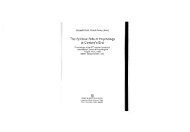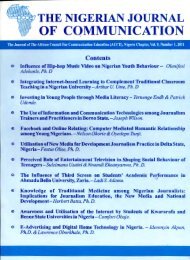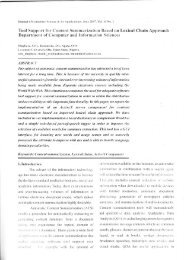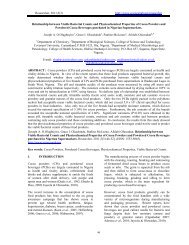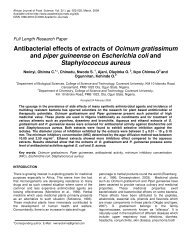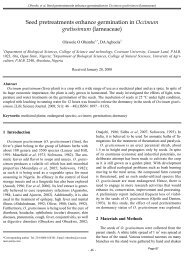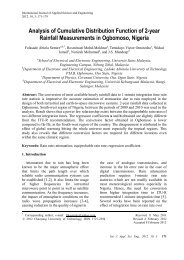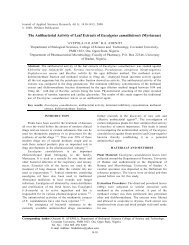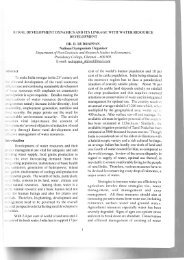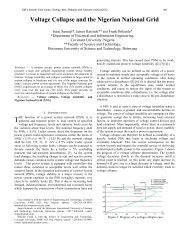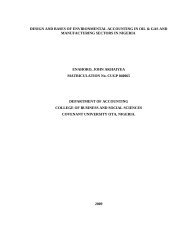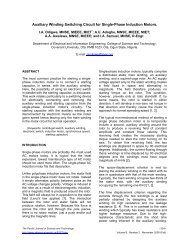Download (8Mb) - Covenant University Repository
Download (8Mb) - Covenant University Repository
Download (8Mb) - Covenant University Repository
You also want an ePaper? Increase the reach of your titles
YUMPU automatically turns print PDFs into web optimized ePapers that Google loves.
215<br />
cannot own property left behind by their deceased husbands. This clearly is in<br />
consonance with the contributions of Kwesiga (2002) and Tuyizere (2007) that, in<br />
traditional African societies, women cannot own property as they are considered to be<br />
part of the household property. In the study, it was established that how land was<br />
acquired determined the choice ofcrops to grow. The reason why this has persisted can<br />
be traced to the deep-rooted customary practices that have often determined the role<br />
and status ofwomen in relation to the men. This view was shared by UNICEF (200I).<br />
The study established that majority ofwomen in OzaIla community who hire<br />
land and some who receive land from their husband or his relations arc those who are<br />
widowed and have little or no male support. This is aptly supported by the work of<br />
Boserup (1990) that women, particularly the female heads ofhouseholds without male<br />
support, and who account for a large share of thc agricultural population, are<br />
discriminated against in terms ofaccess to land, agricultural inputs and credit facilities,<br />
leaving them with few resources to produce sufficient food.<br />
The study further revealed that with its patriarchal social and cultural<br />
structures and gerontocratic style of rulership, in family, quarter and community<br />
meetings, women are not usually invited even when the issues under consideration<br />
greatly affects them. At best, a male representative attends to her needs. They are<br />
indeed the voiceless in the community. Hence, there is male preference in inheritance<br />
and male privilege in marriage because patriarchy thrives. This unfortunate situation is<br />
clearly observed in the work of Ebila and Musiimenta (2004) that in most African<br />
societies, women are oppressed and they suffer several disadvantages in all aspects of<br />
life. .<br />
While these issues are not peculiar to Ozalla community, they have provided<br />
insight and possible avenues towards approaching and addressing the challenges<br />
confronting rural societies across Nigeria and other African societies in their quest to<br />
develop and contribute to national development, including the suppression and<br />
subordination ofwomen. .<br />
Case Study showing the interplay between Patriarchy and Women's Agricuitural<br />
Production in Ozalla Community<br />
This story is that of a renowned farmer who had seven wives and several children.<br />
Three of his wives had male children while the other four had only female children.<br />
After his death, it was time to share his assets. At this time, three ofhis wives had also<br />
died. As the culture stipulates, the available lands and property were to be shared<br />
amongst the children whose mothers had sons. So, all the lands and property were<br />
shared for only the first sons of the three women who had male children. Those with<br />
female children got nothing because ofthe culture that says women are not entitled to<br />
property as they are expected to marry and go to their husbands' houses where they can<br />
benefit from any available inheritance. One ofthe women whose mother had died quite<br />
early without a male child, and who over the years worked tirelessly alongside her<br />
father until she got married, wanted a portion of land to farm as she had challenges<br />
getting land to farm in her place ofmarriage. She therefore presented herrequest before<br />
her halfbrothers. After several visits to them, one ofher half brothers accepted to help<br />
her and took her to a thick forest several kilometers away. She spent so much money<br />
hiring labour to clear the portion ofland given to her, including that offelling the trees<br />
as the land was like a virgin land. Thereafter she planted some food crops such as Yam,



